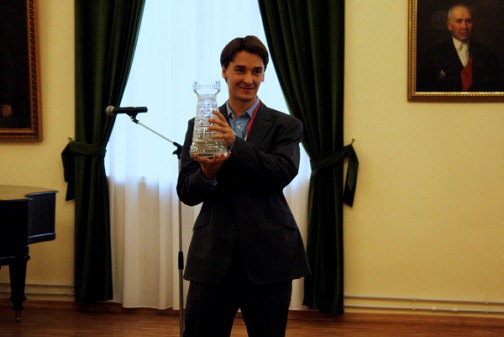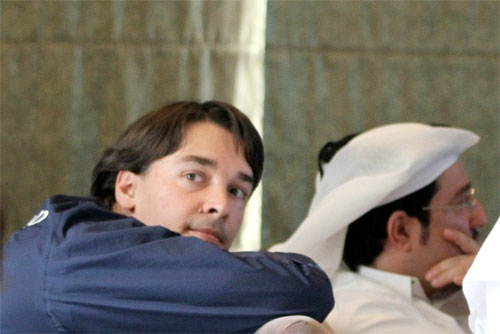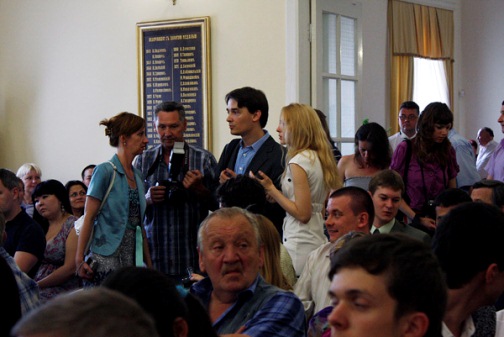Alexander Morozevich’s victory in the Russian Higher League was a rare treat for his legion of fans, and all the more remarkable as in an interview afterwards he revealed it was a last-minute decision to take part. The enigmatic grandmaster talked about whether this marked a return to chess.

Morozevich with the winner's rook | photo: russiachess.org
Morozevich started the Russian Chess Championships Higher League in Taganrog slowly, before pulling clear of the field with a remarkable 4-game winning spurt from the 6th to the 9th rounds. It wasn’t so much that the sporting results were impressive (beating two of his direct rivals), but that he was back playing the kind of complex and creative chess he’s famous for. After a difficult couple of years (which still seem shrouded in mystery) we’ll see him again soon. Back in the 2700-club, he’s playing in Biel next month and has qualified for August’s formidable Russian Championship.
After his victory he talked to Anna Burtasova for the Russian Chess Federation website:
Alexander, congratulations on your victory! I got the impression that in the first half of the tournament you were just gaining momentum, while in the second half you got into form and started to show what you were capable of…
Yes, that’s how it went. It’s no accident you had that impression and it was reflected in my games.
So could you say that by the end you were in optimum form?
The idea of optimum form is always very tricky, as you can always improve. But compared to the way I played in the last five or six tournaments I undoubtedly upped my game.
What was behind your decision to enter the Higher League of the Russian Championship at the last minute, as after all you weren’t originally on the list of participants?
I hadn’t played for a long time. It’s true, the Higher League wasn’t in my plans. I was, let’s say, wound up in my own processes, and until the last moment I didn’t know if I was going to be able to play. It only became clear that I could at the start of June. Then I approached the federation with the matter, and they included me. I was also lucky that there was an odd number of players before me.
Is it possible to say you’re again planning on actively appearing in tournaments?
After the way I’ve been playing, yes. I didn’t originally have any such plan, as I didn’t know how I was going to play, or what to expect.
So the Higher League was something of a test?
Of course. Tournaments once every half year don’t prove anything, as it’s just too big a break. The end of my active professional career essentially came in January 2010, so almost one and a half years has passed. In general the word “plan” doesn’t really fit, because you can plan when you’re certain of something. In my case I had no basis for arranging any kind of plans, as no-one, including myself, knew what was going to happen when I sat down at the board. At first there was only going to be the one tournament in Biel this summer. Nothing else. I simply thought that was too abrupt – going to a Category-19 tournament without being warmed up. Playing a tough qualifier in Taganrog, getting the feel for what it means, was the correct decision.
Now the tournaments have sharply increased – in July Biel, in August, the Superfinal.
When I travelled to the Higher League I joked to my friends: “I’ll go there, warm up, and God forbid I qualify”. The thing is, the Superfinal in August isn’t at the most convenient of times for me, as I’ll have to forgo my own plans. That was the only month when I already had real plans which I truly didn’t want to change. But for the sake of the Superfinal that’s something I’ll have to do. That’s despite the fact that it would have been impossible to predict I’d qualify, and after the first games it was clear that it was a long time since I’d sat down at the board, and I was making moves with great difficulty.
How did you manage to overcome that situation?
I think I simply got used to playing. I played a bit, remembered how it went, and began to play better.
Back at the centre of attention | photo: russiachess.org
Have you thought about gradually returning to the Russian team?
Not yet. My goal is the next tournament. For now that’s Biel, then the Superfinal. When I’ve played a few tournaments I’ll draw conclusions. You can’t make long-term plans on the basis of one result, even a successful one. Moreover, it was a Swiss tournament, where there was an uneven line-up – that’s one tournament; in Biel it’s going to be a round-robin with elite players – another tournament; the Superfinal is a short closed tournament with one round, a third tournament. Having played in such different formats with stronger opponents it’ll be possible to reach some sort of conclusion.
What’s the situation with your coaching contract in Qatar? Is it completely over?
That’s a complex question, as the contractual part of the work is over. But in principle they’re waiting for me there, and our relationship remains very good. If, for instance, I’d played badly in Taganrog and Biel and felt I was at a dead end, that despite all my efforts I couldn’t show anything, then I could consider the option of working in Qatar some sort of formula for the future. But while I’m playing I won’t, of course, combine that with coaching.

Morozevich at the Women's Grand Prix in Doha, Qatar earlier this year | photo: FIDE
We’ll be able to see Morozevich again next month at the Biel Chess Festival from the 16 July, where his opponents will include Magnus Carlsen and Alexei Shirov. Then he’s playing in the Russian Championship in August. Ilya Levitov revealed in an interview at Chess-News that this year’s line-up will include Vladimir Kramnik, making the event a true supertournament. The full line-up is:
Vladimir Kramnik, Peter Svidler, Sergey Karjakin, Ian Nepomniachtchi, Alexander Grischuk, Alexander Morozevich, Alexander Galkin and Artyom Timofeev.



Nice to see Moro back!
I missed him, he brings so much creativity to the chess.
Wodzu’s message captures my feelings about Morozevich’s comeback. His creativity and unpredictability are now accompanied by an aura of mystery about him.
Wodzu is Polish, I guess, so can he or mishanp help me understand why Morozevich’s name is spelled Moroziewicz in Polish? It is not pronounced like that in Russian, right? The soft ‘z’, I mean.
Polish spelling reflects the Russian pronunciation more precisely than the English spelling. ‘Z’ is soft (but the Polish soft ‘z’ is pronounced somewhat different from the Russian soft ‘z’).
Moro’s is my favourity Iwish him all the best